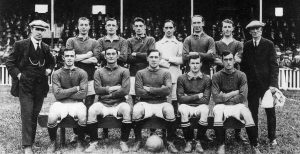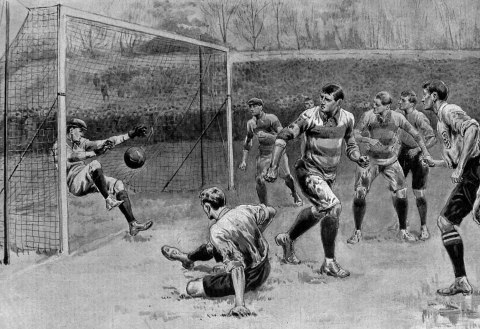The history of football in England is a fascinating topic that has captivated fans of the sport for generations. From its early origins in medieval England to the modern game we see today, football has played an important role in shaping English culture and identity. Today we will explore the rich history of football in England, from its earliest beginnings to the present day, and examine the key events and figures that have helped to shape the sport we know and love.
The Origins of Football in England:
Football has a long and rich history in England, dating back to the medieval period. While the exact origins of the game are unknown, it is believed to have been played by village communities as a way to pass the time and keep fit. These early forms of football were often violent and lacked any kind of rules or structure, with entire villages taking part in chaotic games that sometimes lasted for days.
As the game evolved, rules and regulations were gradually introduced, and by the 19th century, football had become a popular pastime among the middle classes. The first official football match took place in 1863 between two teams, and the Football Association (FA) was founded the same year to oversee the sport and establish a set of rules and regulations.

The Early Years of Professional Football:
Professional football in England began in the late 19th century, with the formation of the Football League in 1888. The league initially consisted of 12 teams, and the first league champions were Preston North End. The league quickly grew in popularity, with teams from across the country joining and competing for the title.
The early years of professional football were marked by a series of controversies and scandals, with allegations of match-fixing and bribery tarnishing the sport’s reputation. However, the game continued to grow in popularity, and by the turn of the century, football had become an integral part of English culture.
The Golden Age of English Football:
The period between the 1950s and 1970s is often referred to as the “Golden Age” of English football. During this time, the national team enjoyed unprecedented success, winning the 1966 World Cup on home soil. The domestic game also flourished, with clubs like Manchester United and Liverpool dominating the league and winning multiple European trophies.
However, the 1970s also saw a shift towards a more defensive style of play, as teams began to prioritize keeping a clean sheet and playing a more strategic game. Despite this, the era saw the emergence of some of the greatest players in English football history, such as Bobby Charlton, George Best, and Jimmy Greaves.
The Rise of the Premier League:
In 1992, the English Football League was restructured to create the Premier League, which is now the top tier of professional football in England. The Premier League has become one of the most popular and competitive leagues in the world, with teams like Manchester United, Liverpool, and Arsenal achieving unprecedented success.
The Premier League era has also seen the emergence of some of the greatest players in English football history, such as Alan Shearer, Thierry Henry, and Cristiano Ronaldo. The league has also attracted some of the world’s top managers, including Jose Mourinho, Arsene Wenger, and Pep Guardiola.
Challenges Facing Football in England:
Football in England is currently facing a number of challenges, including concerns over player safety and the impact of technology on the game. However, the sport remains one of the most popular and beloved pastimes in the country, and it is likely to continue to grow and evolve in the years to come.
The English Football Association and the Premier League have both taken steps to address some of the challenges facing the sport, such as introducing new rules to protect players from concussion and other injuries. There have also been efforts to introduce technology into the game, such as the use of video assistant referees (VAR) to help with decisions on the pitch.
Another challenge facing football in England is the issue of racism and discrimination within the sport. Despite efforts to combat racism and promote diversity and inclusion, incidents of racial abuse and discrimination continue to occur both on and off the pitch. This has led to calls for more action to be taken to tackle the issue, including tougher penalties for those found guilty of racist behavior.
Despite these challenges, football in England remains a beloved and integral part of the country’s culture and identity. The sport has played a key role in shaping English society and has helped to bring people from different backgrounds together.
Conclusion:
In conclusion, the history of football in England is a rich and fascinating topic that has evolved over centuries to become the beloved and popular sport we know today. From its humble beginnings as a violent and unstructured game played by village communities, to the modern professional game that attracts fans from around the world, football in England has undergone significant changes and faced numerous challenges.
Despite these challenges, football in England has remained a central part of the country’s culture and identity, bringing people together and inspiring a sense of community and belonging. As we look to the future of the sport, it is clear that football in England will continue to evolve and adapt to the changing world around it, while remaining true to its roots and traditions.




